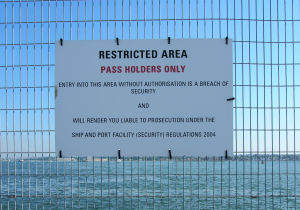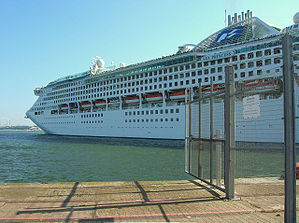
International Ship and Port Facility Security Code
Encyclopedia


International Convention for the Safety of Life at Sea
The International Convention for the Safety of Life at Sea is an international maritime safety treaty. The SOLAS Convention in its successive forms is generally regarded as the most important of all international treaties concerning the safety of merchant ships.- History :The first version of the...
(1974/1988) on minimum security arrangements for ship
Ship
Since the end of the age of sail a ship has been any large buoyant marine vessel. Ships are generally distinguished from boats based on size and cargo or passenger capacity. Ships are used on lakes, seas, and rivers for a variety of activities, such as the transport of people or goods, fishing,...
s, port
Port
A port is a location on a coast or shore containing one or more harbors where ships can dock and transfer people or cargo to or from land....
s and government
Government
Government refers to the legislators, administrators, and arbitrators in the administrative bureaucracy who control a state at a given time, and to the system of government by which they are organized...
agencies. Having come into force in 2004, it prescribes responsibilities to governments, shipping companies, shipboard personnel, and port/facility personnel to "detect security threats and take preventative measures against security incidents affecting ships or port facilities used in international trade."
History
The IMO states that "The International Ship and Port Facility Security Code (ISPS Code) is a comprehensive set of measures to enhance the security of ships and port facilities, developed in response to the perceived threats to ships and port facilities in the wake of the 9/11 attacks in the United States" (IMO).
Development and implementation were sped up drastically in reaction to the September 11, 2001 attacks
September 11, 2001 attacks
The September 11 attacks The September 11 attacks The September 11 attacks (also referred to as September 11, September 11th or 9/119/11 is pronounced "nine eleven". The slash is not part of the pronunciation...
and the bombing of the French
France
The French Republic , The French Republic , The French Republic , (commonly known as France , is a unitary semi-presidential republic in Western Europe with several overseas territories and islands located on other continents and in the Indian, Pacific, and Atlantic oceans. Metropolitan France...
oil tanker Limburg. The U.S. Coast Guard
United States Coast Guard
The United States Coast Guard is a branch of the United States Armed Forces and one of the seven U.S. uniformed services. The Coast Guard is a maritime, military, multi-mission service unique among the military branches for having a maritime law enforcement mission and a federal regulatory agency...
, as the lead agency in the United States
United States
The United States of America is a federal constitutional republic comprising fifty states and a federal district...
delegation to the International Maritime Organization
International Maritime Organization
The International Maritime Organization , formerly known as the Inter-Governmental Maritime Consultative Organization , was established in Geneva in 1948, and came into force ten years later, meeting for the first time in 1959...
(IMO), advocated for the measure. The Code was agreed at a meeting of the 108 signatories to the SOLAS convention in London in December 2002. The measures agreed under the Code were brought into force on July 1, 2004.
Scope
The ISPS Code is implemented through chapter XI-2 Special measures to enhance maritime security in the International Convention for the Safety of Life at Sea (SOLAS).The Code is a two-part document describing minimum requirements for security of ships and ports. Part A provides mandatory requirements. Part B provides guidance for implementation.
The ISPS Code applies to ships on international voyages (including passenger ship
Passenger ship
A passenger ship is a ship whose primary function is to carry passengers. The category does not include cargo vessels which have accommodations for limited numbers of passengers, such as the ubiquitous twelve-passenger freighters once common on the seas in which the transport of passengers is...
s, cargo ship
Cargo ship
A cargo ship or freighter is any sort of ship or vessel that carries cargo, goods, and materials from one port to another. Thousands of cargo carriers ply the world's seas and oceans each year; they handle the bulk of international trade...
s of and upwards, and mobile offshore drilling unit
Oil platform
An oil platform, also referred to as an offshore platform or, somewhat incorrectly, oil rig, is a lаrge structure with facilities to drill wells, to extract and process oil and natural gas, and to temporarily store product until it can be brought to shore for refining and marketing...
s) and the port facilities serving such ships.
The main objectives of the ISPS Code are:
- To detect security threats and implement security measures
- To establish roles and responsibilities concerning maritime security for governments, local administrations, ship and port industries at the national and international level
- To collate and promulgate security-related information
- To provide a methodology for security assessments so as to have in place plans and procedures to react to changing security levels
Requirements
The Code does not specify specific measures that each port and ship must take to ensure the safety of the facility against terrorism because of the many different types and sizes of these facilities. Instead it outlines "a standardized, consistent framework for evaluating risk, enabling governments to offset changes in threat with changes in vulnerability for ships and port facilities."For ships the framework includes requirements for:
- Ship security plans
- Ship security officers
- Company security officers
- Certain onboard equipment love
For port facilities, the requirements include:
- Port facility security plans
- Port facility security officers
- Certain security equipment
In addition the requirements for ships and for port facilities include:
- Monitoring and controlling access
- Monitoring the activities of people and cargo
- Ensuring security communications are readily available
United States
The United States has issued regulations to enact the provisions of the Maritime Transportation Security Act of 2002 and to align domestic regulations with the maritime security standards of SOLAS and the ISPS Code. These regulations are found in Title 33 of the Code of Federal RegulationsCode of Federal Regulations
The Code of Federal Regulations is the codification of the general and permanent rules and regulations published in the Federal Register by the executive departments and agencies of the Federal Government of the United States.The CFR is published by the Office of the Federal Register, an agency...
, Parts 101 through 107. Part 104 contains vessel security regulations, including some provisions that apply to foreign ships in U.S. waters.

